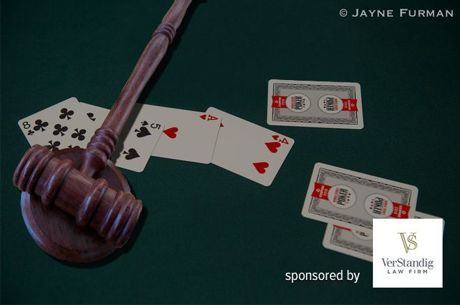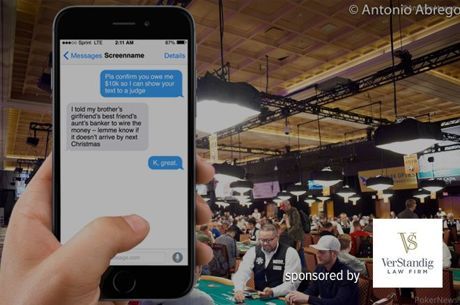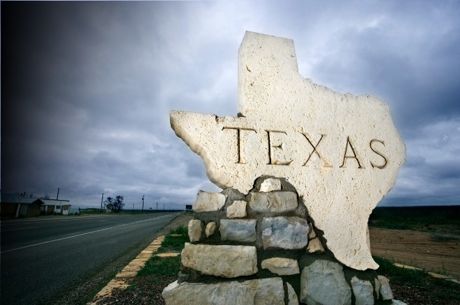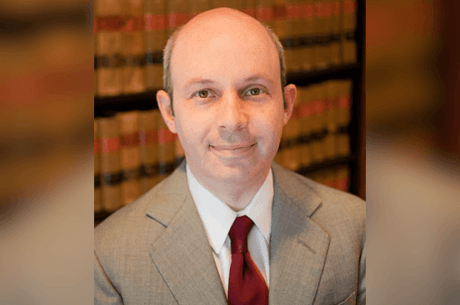WSOP Insights: Stop Bluffing
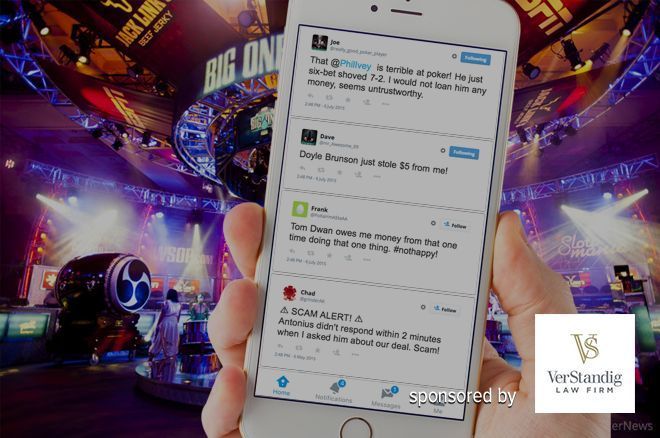
Maurice “Mac” VerStandig is the managing partner of the VerStandig Law Firm, LLC, and focuses his practice on representing poker players, advantage gamblers, and other industry professionals in all manner of legal situations. He can be reached at 301-444-4600, or mac@mbvesq.com.
A healthy plurality of poker disputes cross the inbox of Molly Mossey or myself, often a touch too late for any preventative intervention and just in time for an intensive triage. The spectrum they run is wider than the column inches afforded this missive, and we long ago eclipsed the cliché threshold of ceasing to be genuinely surprised by much of anything. To each incident, I generally owe a duty of confidentiality, which is sacrosanct. But general trend lines are far from privileged in nature, and over the past few years, one particular legal problem has steadily risen from being an anecdotal oddity to a borderline epidemic: defamation.
over the past few years, one particular legal problem has steadily risen from being an anecdotal oddity to a borderline epidemic: defamation.
Fifty states have fifty sets of laws, and it is a gross oversimplification to conflate them all into a singular standard. But as a rough concept, people cannot make false statements about others without risking a judicial rendezvous. In some contexts, slander is only forbade if the speaker knows of the underlying falsity; in other contexts, negligently speculative fodder can be just as problematic. At least one state (with a very large poker community) regards defamation as a crime; in most pockets of the country, it is merely grounds for a civil lawsuit.
Nowhere, however, is libel a form of speech protected by the First Amendment; the majority of sweeping “it’s a free country” protestations to the contrary are borne of a peculiar blend of naivete and defensive spite. And while many of us giggled our way through an 11th grade US history reading assignment about the time Hustler magazine called into question the fidelity and premarital chastity of a certain televangelist’s mother, relying on the constitutional protections afforded parody, outside the pages of the Onion, is about as prudent as relying on a runner/runner combination to garner a chop.
Worse, it does not seem overly difficult to pinpoint a correlative cause for the uptick in defamation spats in the poker community, and it is one unlikely to yield anytime soon: with the rise of Twitter and Facebook, obnoxious exaggerations once shared only with those in earshot, are now hyper-syndicated from Monaco to Macau, and all points between, in a matter of milliseconds. That people can so easily bang out 280 characters before coming off tilt most certainly does not help the problem.
with the rise of Twitter and Facebook, obnoxious exaggerations once shared only with those in earshot, are now hyper-syndicated from Monaco to Macau
And just to further deepen the issue, the poker community is largely immune to one of the core legal safeguards meant to deter people from bringing their defamatory actions to court: damages. Indeed, while an average citizen may be rightfully peeved by a counterfactual rumor that his mother still picks out his work outfits every day, he will have a difficult time showing a judge how he has been financially harmed by hushed snickering about his pink overalls. But in an era of staking, coaching, and absurdly arrogant self-brand awareness, any untruthful assertion about a poker player’s integrity, navigation of the game, bankroll, or even winning hand, can have genuine economic – and, thus, civilly actionable – consequences.
So as poker sleepaway camp draws to a close and much of the Rio’s temporary population returns to their homes near and far, a few tips to help ensure your circuit schedule is not interrupted by depositions:
Opine – Don’t Lie
As has become a familiar refrain of various CNN anchors in the Trumpian era, everyone is entitled to their own opinion but no one is entitled to their own facts. While decency and good taste should operate as important checks on everything that emerges from your mouth or keyboard, you are very much free to lob generic adjectives with little care. You can even announce on Twitter that a certain poker pro is a “spinelessly moronic nogoodnik whose time at the tables is a merely temporary layover en route to his almost-certain final destination in a corner of the abyss so far past the River Styx as to be even beyond the imagination of Dante himself” – that is an opinion (colorful as it may be) to which you are wholly entitled. But you cannot come out and suggest there is a photographic evidence he was loitering in a grassy knoll in Dallas one November morning in 1963 – that is a factual assertion fully capable of beckoning a process server to your door.Avoid Finances
So your best friend's sister's boyfriend's brother's girlfriend heard from this guy who knows this kid who's going with the girl who saw a certain poker player holding a cup on the intersection of Flamingo and Decatur last week, meaning he is definitely busto. That’s lovely – go down to 31 flavors, have a chat with Ferris Bueller, and keep it to yourself. Unless you very much know the person in question, and they literally owe you money, keep it off social media and keep it away from table chatter. There are a number of states where so much as calling into question someone’s financial wherewithal is grounds for a defamation suit – even if no damages can be shown – and in an industry where going broke invites speculation about bad play and bankroll leaks in other corners of a casino, this is particularly perilous fodder.Anonymize Your Bad Beat Stories
I’m not going to advocate for any form of dishonesty aside from actual in-game bluffing, but for as long as Vegas has spread poker games, people have returned from the desert with inflated bad beat tales, and it would be foolish to surmise that will change anytime soon. So if you are not comfortable telling people that your Main Event chip stack was lost to a series of hands where you took a 7 high to showdown, at least do not drag actual names into your two-outer fables. Saying “some tourist shoved on a gutshot and rivered me to the rail,” while not ideal, is unlikely to land you in any trouble; propagating rumors that a specific poker pro – who may well be relying on the staking funds of others – made the reckless play, could land you in appreciable hot water.Stay in Your Lane
Calling people out in the TPT forums is a dangerous pastime. And while you should never hesitate to defend your own name or your own actions, be careful when casting aspersions upon others. If backers are bemoaning that a certain pro did not cash a tournament you were in and speculating whether or not she oversold her action, do not volunteer that you never saw her in the room, unless it was a one table field and you personally stared down – and IDed – every player from the moment cards went in the air until the moment late reg closed. Hedging and being cute with your prose will only help you so much; inferential suggestions, without enormous legal care, can still be actionable in nature.
Finally, with this drawing to a close my weekly WSOP Insights columns for 2018, one last shameless plug: When in doubt, call a lawyer.
I’ve edited blog posts, YouTube videos, Tweets, Facebook posts, and any number of other items for poker clients, with an eye toward preemptively ensuring a tirade not beget a lawsuit. And as a proud member of the poker community who very much wants to see it – and all its members – thrive, I would rather nip and tuck unpublished rants twenty more times in the coming year than have another twenty summonses hit my desk before my Twitter feed is again overrun by people ordering walberry shakes.

